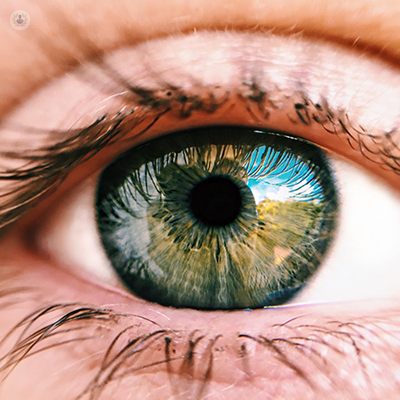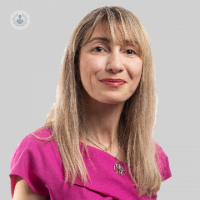Age related macular degeneration: your questions answered by a specialist
Written by:Age related macular degeneration (AMD) is a condition that can affect our eyesight as we age. The macula is the part of the eye responsible for providing clear, good quality images. In the normal ageing process, it is possible that the macula may lose some of its functionality and degeneration in vision quality occurs. The progression of the condition varies according to its form but can, in the worst cases, result in sight loss. As such, it is hugely important to be aware of early warning signs of the condition. In this article, highly esteemed consultant ophthalmologist, Dr Gabriella De Salvo gives expert advice on monitoring eye health and symptoms of the onset of AMD, as well as providing insight on current treatment options as well as those in development.

Is it possible to stop or slow the progression of AMD?
Age related macular degeneration (AMD) has two forms: wet and dry. The dry form is more common in patients with AMD, between eighty and ninety per cent, and has a slower progressing effect on quality of eyesight. The wet form is less common and may have a faster progression, resulting in a sudden decrease in vision quality.
There is currently no available treatment for the dry form of AMD. However, there are a few active clinical trials which show promising results in slowing the progression of the permanent macular damage caused by the disease.
The wet form can currently be treated, but a cure is not yet available. Injections inside the eye are used for this purpose, known as intravitreal injections. The injections are given at regular intervals, from four to a maximum of twelve weeks gap. They can stop the progression of the condition in sixty per cent of cases, stabilise the disease in thirty per cent and may be ineffective in ten per cent of cases.
How close are we to a cure for AMD?
Finding a proper cure for AMD is the main challenge for those working in the retina field. Currently, a number of clinical trials are taking place with the aim of exploring new therapeutic options. Additionally, other trials are examining how current treatment by injection may be optimised by lengthening the interval between injections. The effects of longer lasting molecules and of intraocular implants on eyesight is also under investigation.
Does AMD run in families?
Yes, some families are more inclined to get AMD due to their genetic predisposition. Therefore, it is extremely important to have regular ophthalmic check-ups at least once a year after reaching the age of fifty. Ideally, the check-up should also include a high-resolution macular scan (optical coherence tomography: OCT) to identify possible changes occurring at the macula that may be not visible using the slit lamp or microscope.
Are there any lifestyle changes which can help to prevent or reduce the impact of AMD?
In patients affected by dry AMD, a balanced diet rich in leafy green vegetables and foods containing high quantities of lutein, such as spinach, kale and pistachios, may slow the progression of the condition. Avoiding direct eye exposure to the sun by wearing sun glasses and avoiding smoking can also help to protect the eye. TV exposure does not increase the risk of AMD, but long exposure to blue-violet light LED may do so.
How can I monitor my eye health?
You can self-monitor your vision by checking the Amsler grid, one eye at a time, on a weekly basis. If you see wavy lines or black spots, you should visit your eye specialist and report your symptoms.

Also, annual check-ups with your optician or your eye doctor will help detect any subtle, unnoticeable changes to your macula.
Are there any early warning signs of the onset of AMD? When should I see a specialist?
You should promptly see your ophthalmologist if you experience any of the following symptoms:
- distortion
- blurred vision
- abrupt loss of vision
- appearance of blurred or black spots in your field of vision
If you are concerned about changes in your quality of vision or symptoms of age related macular degeneration, you can book a consultation with Dr De Salvo by visiting her Top Doctors profile today.


